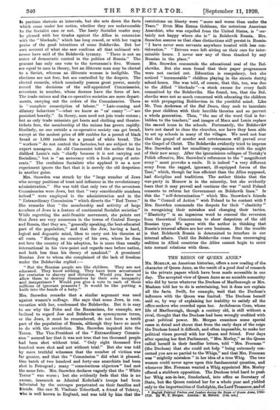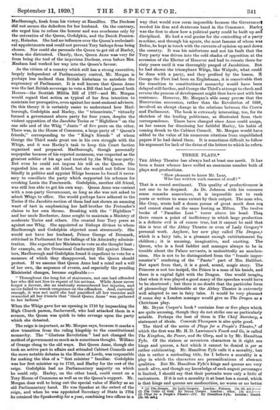THE REIGN OF QUEEN AN\E.* MR. MORGAN, an American historian,
offers a new reading of the character of Queen Anne, as the result of a good deal of research in the private papers which have been made accessible in our day. The accepted view of Queen Anne as an amiable nonentity who did by turns whatever the Duchess of Marlborough or Mrs. Masham told her to do is entertaining, but it does not explain all the facts. Swift, for example, said that the Duchess's influence with the Queen was limited. The Duchess herself said so, by way of explaining her inability to satisfy all the office-seekers who crowded upon her. Archdeacon Coxe, whose life of Marlborough, though a century old, is still without a rival, thought that the Duchess had been wrongly credited with great political power. Mr. Morgan examines some special cases in detail and shows that from the early days of the reign the Duchess found it difficult, and often impossible, to make her political views prevail with her Queen and friend. Four days after opening her first Parliament, " Mrs. Morley," as the Queen called herself in their familiar letters, told " Mrs. Freeman " (the Duchess) that she could not help " being extremely con- cerned you are so partial to the Whigs," and that Mrs. Freeman was " mightily mistaken " in her idea of a true Whig. The two women could never agree upon this fundamental question, and whenever Mrs. Freeman wanted a Whig appointed Mrs. Morley offered a stubborn opposition. The Duchess tried hard to push her Whig son-in-law, Sunderland, into office as Secretary of State, but the Queen resisted her for a whole year and yielded only to the importunities of Godolphin, the Lord Treasurer, and of
• English Political Parties and Leaders during the Reign of Queen Anne, 1702. 1710. By W, T. Morgan. London: H. /Word. [123. net.]
Marlborough, fresh from his victory at Ramillies. The Duchess did not secure the dukedom for her husband. On the contrary, she urged him to refuse the honour and was overborne only by the entreaties of the Queen, Godolphin, and the Dutch Pension- ary, Heinsius. She had no influence over the Queen's ecclesiasti- cal appointments and could not prevent Tory bishops from being chosen. Nor could she persuade the Queen to get rid of Harley, whom she distrusted. Clearly, then, Queen .Anne was very far from being the tool of the imperious Duchess, even before Mrs. Masham had worked her way into the Queen's favour.
As the 'citizen of a country which still has a strong executive, largely independent of Parliamentary control, Mr. Morgan is perhaps less inclined than British historians to antedate the supremacy of Parliament. It is well known that Queen Anne was the last British sovereign to veto a Bill that had passed both Houses—the Scottish Militia Bill of 1707—and Mr. Morgan would regard that action as typical of her firm intention to maintain her prerogative, even against her most eminent advisers. On this theory it is certainly easier to understand how Marl- borough, Godolphin and Harley, the " triumvirate," virtually formed a government above party for four years, despite the violent opposition of the Jacobite Tories or " Highffiers " on the one side and of the Whig " Junto " of five peers on the other. There was, in the House of Commons, a large party of " Queen's friends," corresponding to the " King's friends " of whom George the Third made great use in his own struggle with the Whigs, and it was Harley's task to keep this Court faction organized and prepared. Marlborough, though personally unpopular because of his reputed meanness, was respected as the greatest soldier of his age and trusted by.the Whig war-party. But even he could not impose his will on the Queen. She regarded him as an old friend, but she would not follow him blindly in politics and appoint Whigs because he found it neces- sary to conciliate the party which supported his schemes for crushing Louis the Fourteenth. Godolphin, another old friend, was still less able to get his own way. Queen Anne was content with a non-party Government, so long as she was not asked to admit Whigs to office. She would perhaps have adhered to the Tories if the Jacobite section of them had not shown an amazing want of tact in emphasizing her half-brother the Pretender's claims to her own throne. Breaking with the " Hight:tiers " and her uncle Rochester, Anne sought to maintain a Ministry of moderate Tories and others. She created four Tory peers as against one Whig. She appointed as Bishops divines to whom Marlborough and Godolphin objected most strenuously. She would not have her husband, Prince George of Denmark, criticised. in Parliament for the failings of his Admiralty adminis- tration. She expected her Ministers to vote as she thought best ; for example, on the Occasional Conformity Bill against Dissen- ters, Marlborough and Godolphin found it expedient to vote for a measure of which they disapproved, lest the Queen should protest. If we assume that Queen Anne had a mind and a will of her own, the sequence of events, and especially the puzzling Ministerial changes, become explicable :-
"Throughout the long list of statesmen, not one had offended her who did not live to repent of his actions. While Anne never forgot a favour, she as zealously remembered her injuries, and never failed to wreak vengeance on the offenders. And, curiously enough, it was net until she had punished all her enemies and rewarded all her friends that Good Queen Anne ' was gathered to her fathers." _ When the Whigs gave her an opening in 1710 by impeaching the High Church parson, Sacheverell, who had attacked them in a sermon, the Queen was quick to take revenge upon the party which she detested.
The reign is important, as Mr. Morgan says, because it marks a slow transition from the ruling kingship to the constitutional monarchy. The " Glorious Revolution " had not changed the method of government so much as is sometimes thought. William of Orange clung to the old ways. But Queen Anne, though she took an active part in affairs and attended Cabinet Councils and the more notable debates in the House of Lords, was 'responsible for making the idea of a " first minister " familiar. Godolphin was her first minister up to 1710, and Harley for the rest of the reign. Godolphin had no Parliamentary majority on which he could rely. Harley, on the other hand, could count on a Tory House of Commons as well as on the Queen's support. Mr.
Morgan does well to bring out the special value of Harley as an old Parliamentary hand. He was Speaker at the outset of the reign, and when he was appointed Secretary of State in 1704 he retained the Speakership for a year, combining two offices in a way that would now seem impossible because the Government needed his firm and dexterous hand in the Commons. Harley, was the first to show how a political party could be built up ana disciplined. He had a real genius for the controlling of a party machine, and through his agents, the most famous of whom wag Defoe, he kept in touch with the currents of opinion up and down the country. It was his misfortune and not his fault that the Tory party was driven into the cold shades of opposition at the accession of the Elector of Hanover and had to remain there for sixty years until it was thoroughly purged of Jacobitism. But he had shown the triumphant Whigs, like Walpole, what could be done with a party, and they profited by the lesson. It George the First had been an Englishman, it is conceivable that the transition to constitutional monarchy would have been delayed still further, and George the Third's attempt to check and reverse the process of development might then have met with less resistance. However, Mr. Morgan's able essay proves that the Hanoverian succession, rather than the Revolution of 1688, involved an abrupt change in the relations between the Crown and Parliament. The book is extremely interesting, too, for its sketches of the leading politicians, as illustrated from their correspondence. Times have changed since Anne could assign, as her reason for dismissing her faithful Harley, his habit of coming drunk to the Cabinet Council. Mr. Morgan would have added to the value of his numerous citations from unpublished papers if he had dated them. It is sometimes difficult to follow his argument for lack of the dates of the letters to which he refers.



































 Previous page
Previous page